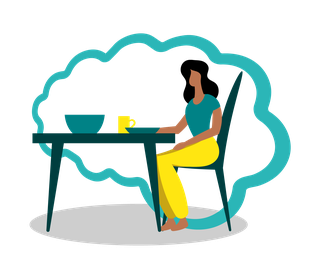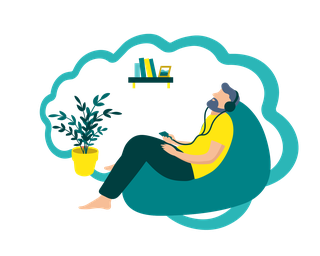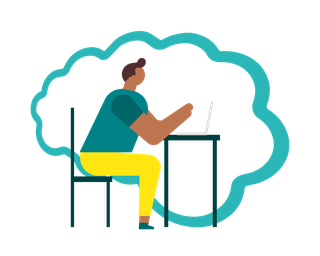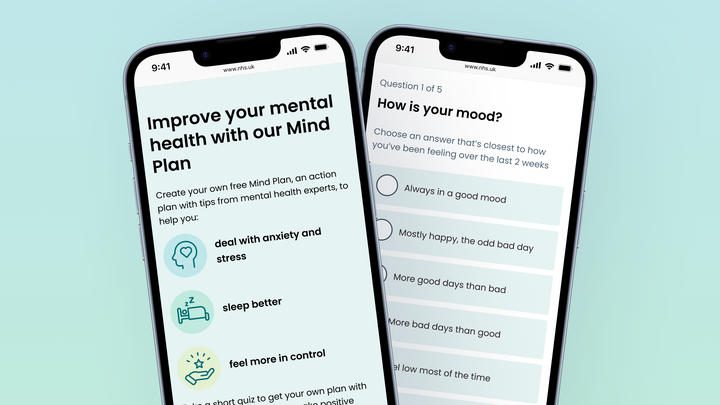6 simple tips to tackle working from home
Working from home, remotely or splitting time between home and the office (hybrid working) has become more common than ever.
Many of us have had to adjust to these new ways of working following the coronavirus (COVID-19) outbreak in 2020. Some of us have even entered the workforce for the first time, starting working life in a remote role, without having experienced an office-based job.
Working from home can have benefits and perks that some of us enjoy (bye bye commute!), but a change like this can be challenging too and can have a big impact on our mental health.
It can cause stress, a lack of motivation, anxiety and uncertainty. Alongside this, we might worry about future job prospects or the best way to juggle work with our personal and family life.
These simple tips can help you feel more productive, motivated and take care of your mental health while working from home.

1. Set and stick to a routine
Without a steady schedule, the line between work and personal time can get blurred and it can be stressful if the balance isn't right.
Follow your normal sleep and work patterns if you can, and stay consistent.
Get up at the same time, eat breakfast and get out of your pyjamas. Try scheduling in your "commute time" and spend it exercising, reading or listening to music before logging in and starting work.
Most importantly, when your workday ends, stop working. Shut down your computer, stop checking emails and focus on your home life. And at the end of the day, try to go to sleep at your usual time.

2. Give yourself a break
Making time for breaks is important to help manage feelings of stress.
Try to take lunch and regular screen breaks, and give yourself time to concentrate on something else so you feel more focused when you return. Even just 5 to 10 minutes of short breaks each hour can really help your productivity.
If possible, spend time outdoors when you can. Regular time in green space is great for your mental health.
Set a time to go for a walk, run or bike ride for some fresh air, or have a tea or coffee break.

3. Make a dedicated workspace
If you can, find a quiet space away from people and distractions like the TV.
Get everything you need in one place, before you start work – chargers, pens, paper and any other equipment – and shut the door if you can. Even in a small or shared space, try to designate an area for work.
Make yourself comfortable. While it might be tempting to sit on the sofa, it's much better to sit or stand at a desk or table. When using a keyboard, try and have your forearms level with the table and elbows at 90 degrees.
If you do not have office furniture like an adjustable chair, try using things like cushions to support you in your chair, or use a box as a footrest.

4. Stay connected
While working from home has its benefits, you may also feel more isolated. But there are lots of ways to stay in touch with those who matter – boosting their mental wellbeing as well as your own.
In and out of work, human interaction matters so schedule video calls and pick up the phone instead of emailing. If you're struggling with working at home, speak to your colleagues or manager about your concerns.
And remember, your colleagues probably feel the same as you. Ask how they're doing and whether there are ways you can support each other.

5. Set boundaries
Setting boundaries with other members of your household is key to mental wellbeing while working at home.
You can be more flexible when working from home, so enjoy it. But it can also be difficult if there are other distractions to deal with, like children at home, who may think you are on holiday and want to spend time with you.
Have a discussion about your needs, especially with family. Remind them that you have work to do and need quiet time to do it, and share your schedule.
Similarly, set boundaries with work. It's easier to stay logged on when your home is your office, but try to switch off when the working day is over, and enjoy time with family or friends.

6. Think longer term
Think about ways you could improve how you work at home. If you have a room that has a more comfortable temperature or has a window that lets in a lot of light, could you work there instead?
Explore how you work with others. Are there different ways to connect online or new software you could use to help the process?
Further support and advice
If you feel low or are struggling with feelings of isolation, support and advice are available. Find out more about low mood or how to deal with loneliness.
For more advice on how to look after your own mental health while working remotely, visit the Mind website.


